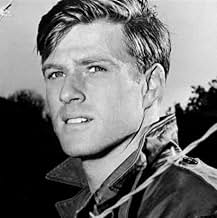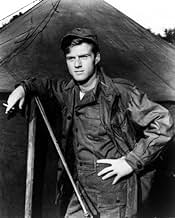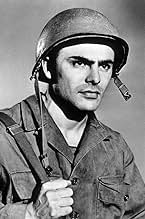Dispatched to the front lines during the Korean War, an idealistic American soldier discovers the horrors of combat and comes at odds with a psychopathic member of his platoon.Dispatched to the front lines during the Korean War, an idealistic American soldier discovers the horrors of combat and comes at odds with a psychopathic member of his platoon.Dispatched to the front lines during the Korean War, an idealistic American soldier discovers the horrors of combat and comes at odds with a psychopathic member of his platoon.
- Nominated for 1 BAFTA Award
- 2 wins & 1 nomination total
- Army Truck Driver
- (uncredited)
- Director
- Writer
- All cast & crew
- Production, box office & more at IMDbPro
Featured reviews
Anyway, my point is that this was a non-studio production of stark originality at a time when war was still being celebrated by a WWII-besotted studio industry. War Hunt is not exactly an anti-war film on the order of a Paths of Glory or Attack-- after all, Endore's scary psychopath can be shrugged off as a wild exception to the average GI. What the movie does suggest is that a deranged mind like Endore's can prove highly useful in wartime, even get a medal slapped on his chest for the tactical value his obsession with killing provides (on a more strategic scale, consider the intellectual value of the equally deranged Dr.Strangelove).
Because of his battlefield information, Endore is allowed to fight his own war, by his own rules, free from the restrictions placed on normal soldiers, while command looks the other way. In short, Endore's particular form of psychosis finds a home in combat where it not only thrives, but also proves of real instrumental value to the higher-ups. In peacetime, he would get a strait-jacket; in wartime, he gets a commendation. Whether his psychopathic actions also promote a greater good amounts to an unspoken ethical dilemma not taken up by the picture-- and is likely why the script fudges the dilemma by having his obsession threaten the very truce itself. (An unlikely consequence since truces are notoriously slow to take hold, anyway.)
The movie itself is no unmixed triumph. There's no motivation for Loomis' standing up to Endore over the Korean boy, unless we extrapolate some symbolism about youth representing the future and Loomis standing for American idealism. In fact, the film's very last line supports some such surmise. Moreover, John Saxon's Endore is truly frightening-- until he opens his mouth. I don't know whether it's the uninspired lines given him or Saxon's rather pedestrian delivery, but neither measures up to Saxon's coldly menacing presence nor the character's bold concept. Then too, the scene with battalion command fails because no one, including Saxon, has a good grasp of how a unique character like Endore should handle it. (And on a more minor note: How could he possibly get through Basic Training since he doesn't just resist authority, he can't even comprehend it!-- as the battalion command scene shows.)
On the plus side stands Redford's nicely understated Loomis, whose character wisely resists heroic proportions. Charles Aidman too, comes across intelligently as a weary and beleaguered company commander willing to bend the rules for tactical advantage. At the same time, as others point out, the photography is appropriately grainy and gritty, blending well with the occasional stock footage. But most of all, there remains that frighteningly eerie glimpse of Endore's demonic little dance around his latest slashed throat. What mysterious god of madness is he invoking somewhere inside that dark pool that is his psyche. And what strange secrets has he imparted to the boy to carry into the future. I've seen nothing like this peculiar ritual before or since, and it is truly more unsettling than the gallons of fake blood spilled by contemporary horror-fests.
Judging from the Sanders' profile, it looks like their careers petered out on television. What a disappointment after such a promising beginning. There must be some inside story here that I wish I knew. Be that as it may, War Hunt remains truly one-of-a-kind, a really scary glimpse of a mysteriously psychotic figure freed up by the dogs of war.
The picture is clearly stated and openly defined... Pvt. Raymond Endore (John Saxon) goes out at night on 'solitary' patrols... The information he brings back is very useful for Capt. Wallace Pratt (Charles Aidman) whose posture toward Endore is 'paternal' gratification...
But the strong reason to his voluntary patrol is to murder... He is a ritual killer practicing a formal act with his knife, and after finishing with his victim, he stands behind the body in mystical meditation...
Even after the cease-fire on the Korean front, Endore extends his night patrols... This 'psycho' mind is already sick, and there is nothing to be done to narrow his actions...
With just one major battle scene, "War Hunt" is absolutely a penetrating study of War drama, focusing on its traumatic effects: The 'fighting' soldier and the 'non-fighting' man...
"War Hunt" is ingenious, deeply stimulating, and cautiously photographed... The extraordinary hand-to-hand fight, between Redford and the Chinese soldier, proves it...
John Saxon is terrific as the tormentor and Robert Redford (in his film's debut) is excellent as the idealistic Pvt. Roy Loomis...
This is a very unusual film - powerful, gripping and interesting, the story moved along via voice-over narration by Redford as his character relates his experiences. The film features excellent, thoughtful camera-work including many facial close-ups, and many dark, night-time scenes that gives a haunting feeling to the action. The background music reminded me in style of that often heard during "Twilight Zone" or even "Star Trek" episodes - a sort of 60s sci-fi feeling to it, in a way. The film opens and closes with a nicely done, sentimental chorus of Korean children. An excellent film all around.
The film is set during the last days of the Korean War. Endore (John Saxon) conducts voluntarily patrols to Chinese outposts, and is valued by his commanding officer. The other platoon members appreciate Endores courage and toughness under fire, and probably love the fact his solitary patrols keep them safe in their own lines. But Endore has his own personal motives for his nocturnal sojourns. He gets to kill people, and he probably enjoys it. As a matter of fact, he most likely is a serial killer. No doubt he is a social outcast in civilian life and would be even in the peacetime army. In any other environment, hed wind up in a prison or mental hospital. Luckily (for him) the Korean battlefront is his element.
John Saxon plays Endore to frightening perfection. Blank, emotionless facial expression. Psychotic stare, just a hint of malevolent violence seething beneath his limited social skills. In the films scariest scene, Endore knifes a Chinese soldier to death unnecessarily, then dances around the body. A ritualized killing. Endore is one scary stranger. Id stay away from him, so would you. Hes the guy we read about in the papers, maybe even joke about nervously.
This crazy mans nemesis arrives in the form of Roy Loomis, a young and frightened recruit. He is shocked and disgusted by Endores actions, but is rebuffed by his CO and squadmates. Loomis isn't worth anything. It's Endore who is valuable, who can kill, who can do the dirty work. Loomis is annoyingly innocent however, and you know there's going to be a big confrontation coming up.
The confrontation arrives in the form of a cease fire.The Korean War is ending, but has Endores war just begun? Check it out and see. Fast moving, suspenseful, frightening. Best line: Endore(explaining how he can sneak up on the enemy without being seen) "Because I'm invisible---the truth blinds you."
Did you know
- TriviaFeature film debuts of Robert Redford, Tom Skerritt and Sydney Pollack. Thirty years on, Redford would direct Skerritt in Et au milieu coule une rivière (1992).
- Quotes
[first lines]
Pvt. Roy Loomis: Once you get out of training, you're funneled into what's called the pipeline, and you become a number while you're traveling in it, until you get spewed out somewhere at the other end. After you land, you look for signs of war. A bullet scar in a wall, a bombed out building. You don't have to look very hard. You see a lot of poverty, kids starving. When you get out of the trucks after the ship and the train, you know the pipeline is carrying you further toward the front. You're going to be a combat infantryman, the tip of the spear. You don't know what it will be like or what will happen. You wonder whether you're going to get killed.
- ConnectionsFeatured in Best in Action: 1962 (2018)
- How long is War Hunt?Powered by Alexa
Details
- Release date
- Country of origin
- Language
- Also known as
- La guerre est aussi une chasse
- Filming locations
- Production company
- See more company credits at IMDbPro
Box office
- Budget
- $300,000 (estimated)
- Runtime1 hour 23 minutes
- Color
- Aspect ratio
- 1.66 : 1
Contribute to this page
































